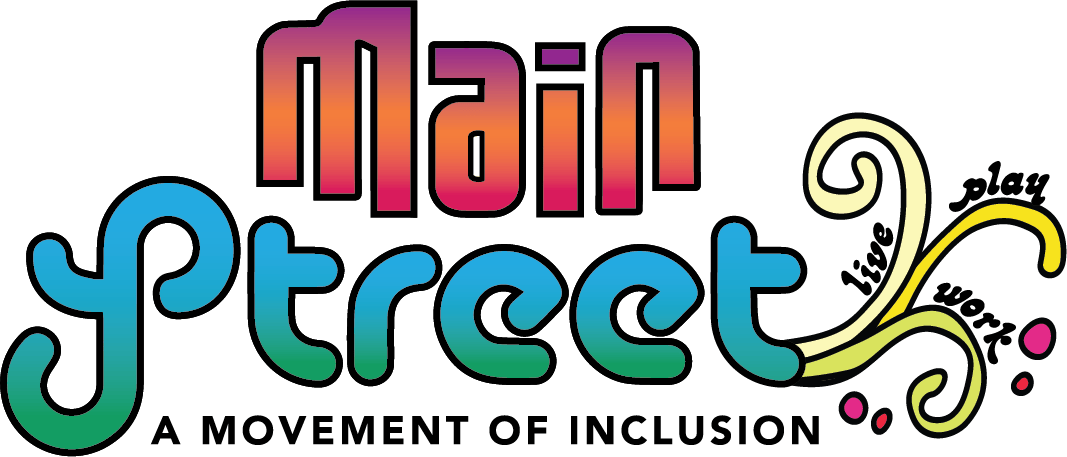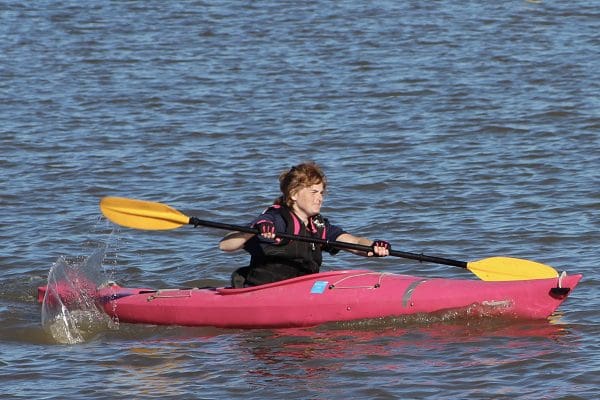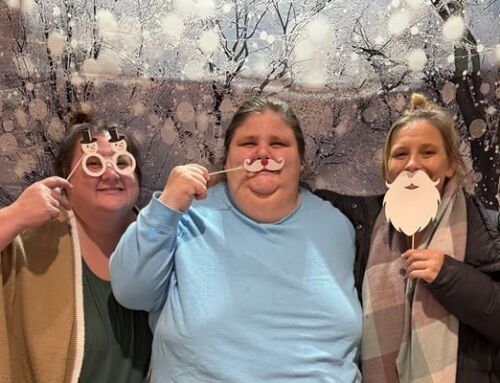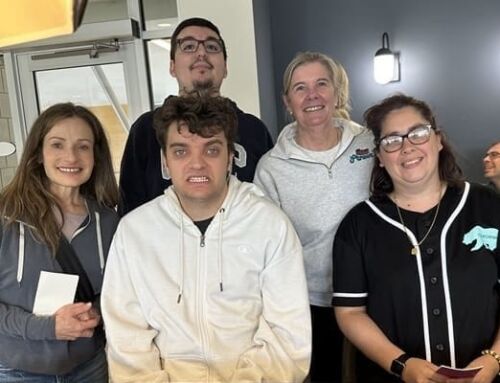A few weeks before the Special Olympics World Games in Berlin, Ashley Thompson is busy with kayaking practices at Black Hill Regional Park, 6 am workouts in the gym, and her part-time job at Wegmans. Still, she’s finding time to learn a few new words before her big trip.
“Alexa,” she’ll say. “How do I say ‘good morning’ in German?”
The 36-year-old Main Street resident won three gold medals at the Maryland State Games this past August, traveled to Texas for a training camp in the fall, and found out in January (on a Zoom, which her mom recorded) that she’d made it to the World Games. Now she has so much USA swag that she doesn’t know how she’ll fit it all in her suitcase. One of her favorites is a T-shirt that reads, Kayaking Around The World. “They gave me 35 pieces of clothing,” Ashley says with a laugh. “It looks like I’m going to college, or moving to Germany.”
Ashley has always loved being on the water. She grew up kayaking with her cousins every summer on the bay on Cape Cod. “Ashley was a good swimmer, and strong, so she was able to just be one of the kids,” says her mom, Holly. She was 15, a student at Seneca Valley High School in Germantown, when she started kayaking with Montgomery County Special Olympics. “She’s not saying it, but she’s extremely competitive,” Holly says. “The first thing she does is get off the water and say, ‘Did I beat them?’ ”
The sport requires a lot of self-discipline, Ashley says. She races in 200, 500 and 1,000-meter events. When she’s out on the water, there’s nobody next to her, and she can’t hear anybody screaming directions or cheering for her. That means she has to stay focused, even when she’s tired or her shoulders hurt. Even when she flies all the way to Texas and the water is 38 degrees. Or when she’s up against headwinds or rip currents.
“I just have to keep going,” Ashley says. “That’s what matters…you have to prepare yourself mentally and physically to be able to get going and try the best you can and never give up on yourself. That’s my motto: Never give up—you have to keep trying.”
She’s been doing that her whole life: Persevering. Born with a rare metabolic disorder that can cause seizures, developmental delays, progressive liver damage and other complications, Ashley’s dealt with serious medical challenges since she was a baby.
“I’m lucky to be alive,” she says.
***
To get ready for the World Games—her first international event—Ashley’s been spending lots of time in the fitness center at Main Street, focusing on arm exercises, core workouts and cardio. When she kayaks locally, she’s often trying to beat her own best times. “I think she’s the strongest woman in the state,” says her longtime coach, Alan Seifert, who has seen Ashley become more and more confident over the years, both as an athlete and a leader. “In practice yesterday she was beating our strongest males in races.” Holly wants to make sure Ashley feels prepared for a higher level of competition, and Ashley likes the deal they’ve made: After workouts, she gets ready for her shift at Wegmans, where she’s worked in the bakery for 10 years, and they stop at Starbucks on the way.
“This time I think you’re gonna do even better than you ever have before, Ash, because you’ve never been in the gym this much,” Holly tells her daughter during a conversation on the patio at Main Street. “I’ve been there five days a week,” Ashley says.
As excited as she is for Germany, Ashley’s nervous about leaving her service dog, Brownie, who she’s never been away from for more than a few days. She has her own apartment at Main Street, and she’s used to having Brownie, an 8-year-old labradoodle, nearby. The dog puts her paws on Ashley’s chest to calm her when she’s anxious. If something’s wrong, she stays by Ashley’s side and barks frantically, especially when Ashley’s at her parents’ house. “She gets my mom and dad’s attention when I have a seizure,” Ashley says.
Ashley was 5 years old when a geneticist told her parents she had argininosuccinic aciduria (ASA), a condition which causes ammonia to accumulate in the blood, according to NIH. Ammonia is produced during the breakdown of proteins; too much of it is toxic. She’d started having seizures when she was a toddler, along with cyclical vomiting after eating certain foods, and more than a dozen bouts of pneumonia. “ASA is an inability to process proteins in your body,” Holly says. “She’s had it from the time she was a baby, but it wasn’t discovered properly. She was misdiagnosed 16 times.”
For Ashley, foods that are high in protein can be dangerous. She can’t just grab a protein bar if she needs one before a race. “I can have French fries—and sweets,” she says. (And other things, including fruits and vegetables.) “If I eat eggs or something, I get really ill.” She’s been working closely with a nutritionist at D.C.’s Children’s National Hospital—where she’s a patient in a metabolic disorders program—to plan ahead for her 17-day trip. Ashley’s parents will be in Germany supporting her, along with her three siblings, aunts, uncles, cousins and godparents (for a total of 25 fans), but she’ll be doing her own thing. “That’s part of the issue with her going to Berlin, training on the water, away from other people,” Holly says. “She definitely has to have some protein, but it’s also a very fine line.”
Ashley doesn’t seem worried. She has other things to talk about: The rainbow explosion birthday cake she baked for her sister, which was filled with Skittles; her latest sport, pickleball; the job she had for 16 years working with elementary school students who have learning differences; the time she volunteered for a study on ASA and spent 30 days inside because she wasn’t supposed to sweat (she helps with research in any way she can, she says.) And Berlin. That too. All the people she’ll meet there, how she’ll get to experience a different culture and trade Olympic pins, how she’s supposed to compete in a two-person tandem race for the first time ever. “It’s gonna be really interesting,” she says with a smile. “A good working vacation, basically.”





